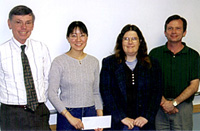![[Currents header graphic]](/homeart/currents_header.gif)
![[Currents header graphic]](/homeart/currents_header.gif)
December 7, 1998
By Tim Stephens

|
| Hao Ji (second from left), recipient of
the Mei Wang Fellowship for Women in Computer Engineering, posing with
computer engineering faculty (Larger
photo)
|
Graduate student Hao Ji has been named the first recipient of the Mei Wang Fellowship for Women in Computer Engineering, awarded by the Departments of Computer Engineering and Computer Science in the Jack Baskin School of Engineering.
Ji, who is pursuing a Ph.D. degree in computer engineering, came to UCSC in 1997 after receiving her M.S. in electromagnetic fields and microwave technology from Southeast University in Nanjing, China.
"In her first year she has made quite an impression in both her course work and her research," said Martine Schlag, professor of computer engineering, who presented the award to Ji at a gathering of the Computer Engineering and Computer Science Departments.
The Mei Wang Fellowship for Women in Computer Engineering was established by the family, friends, teachers, and fellow students of Mei Wang, a UCSC graduate student in computer science and later in computer engineering, who died in a car accident in 1996. The fellowship is given annually to a graduate student in computer engineering or computer science who demonstrates a strong drive to complete her degree.
The fellowship provides Ji with a $500 award to support her academic work. Her instructors uniformly rank her among the top students in her classes, said Schlag. In addition to her course work, Ji is currently involved in research on VLSI design and chip inductance modeling. (VLSI stands for very large scale integration and refers to semiconductor integrated circuits composed of hundreds of thousands of logic elements or memory cells.)
Ji has already made significant progress on her research, according to her faculty adviser, Associate Professor Wayne Dai. "She has recently developed, together with the IBM Austin Lab, a revolutionary approach to on-chip inductance extraction, which is considered to be one of the most difficult problems in the field today," Dai said.